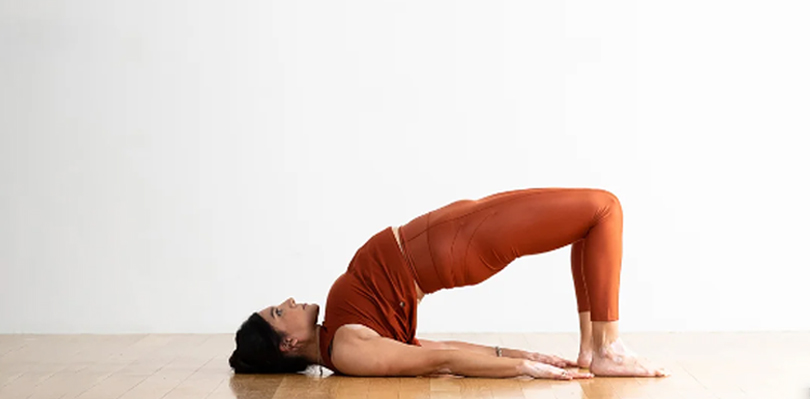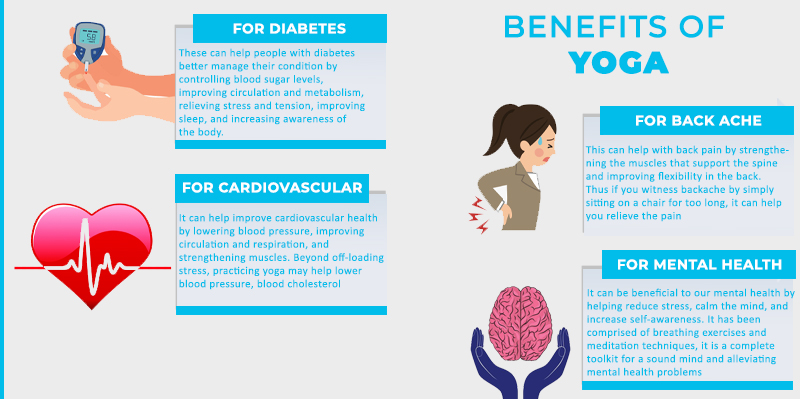Whether you are a beginner contemplating your first yoga class, or a seasoned practitioner looking to deepen your practice, this comprehensive guide will give you everything you need to know about it. From the history and philosophy of yoga to specific poses and benefits, we will explore everything that makes it the unique and powerful practice it is. So roll out your mat, and let’s get started!
Yoga is more than just a workout- it’s a lifestyle that can lead to physical, mental, and emotional transformation. Through regular practice, one can develop increased strength and flexibility, improved breathing and concentration, and a greater sense of well-being. Ready to get started? Read on to learn more about the philosophy behind it.
What Is Yoga

The origin of yoga dates back to ancient India and has since been practiced in various forms as a spiritual practice. It is believed that it can help us connect with our inner selves and the divine source of energy. The philosophy behind it is to promote physical, mental, and spiritual well-being by unifying breath, movement, and meditation.
Yoga is for everybody and everybody, no matter how flexible or strong you are. It can be adapted to suit all levels of fitness and experience. Whether it’s yoga for weight loss, to reduce stress, for anxiety, to improve flexibility, or to boost energy, it has something to offer everyone.
Philosophy Of Yoga
The philosophy behind yoga is to promote physical, mental, and spiritual well-being by unifying breath, movement, and meditation. The practice helps us connect with our inner selves and the divine source of energy that resides within each one of us.
At its core yoga is about self-realization and understanding how we are interconnected with each other and all of life. It encourages us to be mindful of our thoughts, actions, and words. Also, helps us to slow down and become aware of our breath and body.
Yoga also teaches us how to harness the power of our minds by learning to control our thoughts, feelings, emotions, and reactions. This helps us stay connected to ourselves and be more compassionate, understanding, and loving toward others.
Benefits Of Yoga
Yoga can help improve physical health in numerous ways. Also, it helps strengthen and tone muscles, improve balance and posture, increase flexibility, boost energy levels, reduce stress, improve circulation and respiration, aid digestion, helps prevent injuries, and even help with weight loss.

Yoga For Diabetes:
These can help people with diabetes better manage their condition by controlling blood sugar levels, improving circulation and metabolism, relieving stress and tension, improving sleep, and increasing awareness of the body. It helps in dealing with diabetes well. If you practice it for long enough it can reduce the risk of difficulties related to diabetes. This is the initial stage of diabetes controls your diabetes and also gives you the best effects on your health. You can rehearse it for diabetes to control your blood sugar levels.
Also Read: Yoga For Diabetes: Poses, Benefits, And More.
For Cardiovascular Health:
It can help improve cardiovascular health by lowering blood pressure, improving circulation and respiration, and strengthening muscles. Beyond off-loading stress, practicing yoga may help lower blood pressure, blood cholesterol, and blood glucose levels, as well as heart rate, making it a useful lifestyle intervention for those at risk of cardiovascular disease. It can help reduce stress and tension in the body by calming the nervous system, relieving physical aches and pains, and promoting relaxation. Focusing on mindful breathing and conscious movement helps to quieten the mind and create a sense of inner peace.
Yoga For Mental Health:
It can be beneficial to our mental health by helping reduce stress, calm the mind, and increase self-awareness. It has been comprised of breathing exercises and meditation techniques, it is a complete toolkit for a sound mind and alleviating mental health problems like anxiety and depression. What would be more surprising is, it can really help your brain perform better. Moreover, people who practice these regularly have termed this ancient therapy as the psychology that works with the nature of your mind, emotions, and body to cope with issues like low self-esteem, and mental and emotional disorders.
Read More: 7 Ways Yoga Can Improve Your Mental Health Now.
For Hormonal Imbalance:
This can help women balance their hormones naturally by regulating stress levels and increasing circulation, which helps promote healthy hormone production. Hormones play a key role in our overall health and these are our body’s chemical messengers. There are more than 50 different hormones in our bodies. Every hormone has a specific job. Like thyroid hormones are responsible for overseeing metabolism and energy levels, stress hormones have a role in responding to psychological stress and so on. When your hormones are balanced, you will never notice but if they are imbalanced you will see certain changes in your body and other health issues.
Read More: Yoga For Hormonal Imbalances: 5 effective yoga poses.
Yoga For Back Ache:
This can help with back pain by strengthening the muscles that support the spine and improving flexibility in the back. Thus if you witness backache by simply sitting on a chair for too long, it can help you relieve the pain. Even if you are too tired or lazy to go from moderate-intensity or high-intensity fitness workouts, you can opt for it because it helps you relax and energize your body.
Also Read: 5 Best Yoga Poses To Help With Back Ache.
Types Of Yoga
There are many different types of yoga, each one with its own benefits and style. Some of the more popular styles include:
- Hatha Yoga: Hatha is the most traditional form of yoga and is great for beginners. However, it focuses on physical postures and breathing exercises.
- Vinyasa: Vinyasa is a more fast-paced style that links movement with breath.
- Iyengar Yoga: Iyengar focuses on alignment and precision in the poses.
- Restorative: Restorative is a gentle, relaxing form of yoga that promotes relaxation and healing.
- Ashtanga Yoga: Ashtanga is a more challenging style that focuses on linking poses together in a sequence and synchronizing the breath with the movements.
- Kundalini: Kundalini is an energetic practice that combines postures, breathwork, mantra chanting, and meditation.
- Yin Yoga: Yin is a slower-paced practice that focuses on stretching the connective tissues in the body.
Yoga Poses
There are numerous yoga poses, or asanas, that can be used to help strengthen and tone the body. Here are a few poses to get you started:
Mountain Pose (Tadasana): This pose will help improve posture, balance, and strength.
Downward Dog (Adho Mukha Svanasana): This pose helps stretch and strengthen the back, arms, and legs.
Warrior Pose (Virabhadrasana): This pose helps increase balance, strength, and flexibility.
Tree Pose (Vrikshasana): This pose will help improve balance and concentration.
Cobra Pose (Bhujangasana): This pose helps stretch and strengthen the back and core muscles.
Child’s Pose (Balasana): Child pose helps relax the body, reduce stress and fatigue, and release tension.
Yoga can be a great way to improve your physical and mental health. However, it offers numerous benefits that can help you live a healthier, happier life. So why not give it a try? You might be surprised how much it can help you!
Tips For Beginners:
If you’re just getting started with yoga, the following tips can help ensure your practice is safe and enjoyable:
- Start slow and take things one step at a time. Don’t try to do too much too quickly.
- Listen to your body and don’t push yourself beyond what feels comfortable.
- Also, take classes with a qualified yoga instructor. They’ll be able to guide you through yoga poses safely and help you make adjustments as needed.
- Don’t forget to breathe. Focusing on your breath helps deepen its practice and brings attention to the present moment.
- Have fun! it can be a great way to relax and de-stress.
It can be an incredibly beneficial practice for all levels of practitioners. So get ready to slow down, breathe, connect with your body and mind, and start reaping the many benefits it has to offer!
What Doctors Say About Yoga
Many doctors and healthcare professionals worldwide are beginning to recognize It as a valuable form of exercise with numerous health benefits. Dr. Deepak Chopra, an expert in alternative medicine, has stated that it “has been scientifically proven to improve physical, mental, and emotional well-being”.
Other physicians have cited It as being effective in treating various conditions such as arthritis, depression, chronic fatigue syndrome, and high blood pressure. Moreover, it can also help improve flexibility, increase strength and balance, and promote relaxation. All these factors can contribute to greater overall health and well-being.
FAQs
Which is better: yoga or gym?
The answer to this question depends on your individual goals and needs. Also, it is a great option if you’re looking for an effective way to strengthen and tone your body. However, if you’re looking for more of an aerobic workout or intense strength training, then a gym may be the better choice. Ultimately, it’s best to find what works for you.
Are yoga and meditation the same thing?
No, yoga and meditation are not the same things. It is an ancient practice that helps to improve physical health through a series of poses, while meditation is a practice of simply focusing on the breath to achieve greater mental clarity and relaxation. However, it can include a meditation component and many practitioners find that meditating during their practice helps to deepen the experience.
What are the benefits of yoga?
It offers many benefits, both physical and mental. Some of its most common benefits include improved flexibility, strength, balance, posture, and relaxation. Additionally, it can help reduce stress levels while promoting overall well-being. There are also numerous intangible benefits such as greater self-awareness and mindfulness that can offer.
What type of yoga is best for beginners?
The best yoga for beginners depends on individual preferences and goals. Generally, classes labeled as “gentle” or “restorative” are great for beginners. These classes typically feature slower-paced poses and more emphasis on relaxation. Hatha and Yin are also considered to be good for beginners. However, it is a practice that people of all ages and abilities can enjoy. From improving physical health to promoting mental clarity, it has something to offer everyone.
Does yoga help with weight loss?
Yes, it can help with weight loss. It helps to reduce stress, which is a major factor in weight gain. Additionally, This can builds strength and increases flexibility, which is important for healthy weight loss. Finally, some poses can be quite strenuous and can help to increase your calorie burn. So if you’re looking to lose weight, it can definitely be a helpful addition to your overall fitness program.
